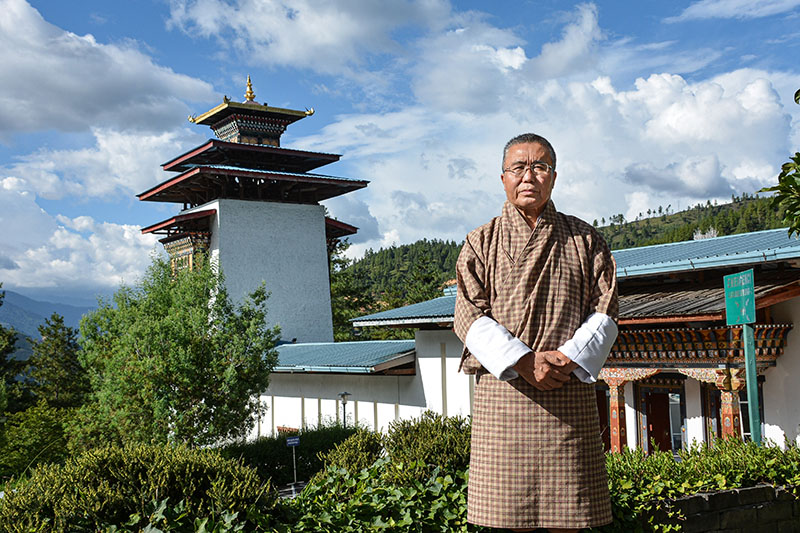2023 UNE Distinguished Alumni Award winner - Tshewang Tandin
In recognition of his achievements and leadership in promoting inclusive education and fostering positive organisational culture in Bhutan
In today’s society, where a nation’s prosperity is so often measured in economic terms, the people of Bhutan march to the beat of a different drum. The principles of Gross National Happiness (GNH), introduced in 1972 by His Majesty the Fourth King, Jigme Singye Wangchuck, set the Himalayan country on an altogether more holistic path to achieving collective wellbeing and progress.
Within the domain of education, 2023 Distinguished Alumni Award winner Tshewang Tandin has devoted much of his 40-year career to implementing the king’s wishes. His development of learning environments, school curricula and governance aligned with GNH principles has transformed education – from secondary schools through to tertiary institutions.
“It was the responsibility of school management to comprehend these principles and foster an environment where GNH could flourish,” Tshewang says. “The idea was that children living and growing in such an environment would naturally acquire GNH values. This involved a transformation of mindset, fostering compassion, instilling sound moral and ethical values, promoting respect for all beings and upholding integrity to stay on the path.”
His personal educational philosophy challenged many traditional practices. “Caning was the primary form of punishment when I started school in 1966,” Tshewang says. “For offences like talking in class, smoking or failing spelling tests, students had to fetch river stones from a location about two kilometres downhill.”
Some schools were withdrawing corporal punishment come the mid-1990s, when Tshewang was undertaking a Masters of Educational Administration (over three Australian summers in the mid-1990s) at UNE*. And by the time he had risen to the ranks of Director of School Education, he was routinely appearing on the Bhutan Broadcasting Service promoting counselling and positive discipline instead.
Tshewang welcomed the Bhutanese Government’s ‘Education for All’ ethos. He played a pivotal role in promoting inclusive education, supporting the School for the Blind and Institute for the Deaf, as well as improving access to quality education for students with disabilities. He made immense contributions to the establishment of institutions that continue to serve as national models, including the Yangchenphug Higher Secondary School, which became the country’s first high school to introduce years 11 and 12; Sherubtse College, the country’s sole college at the time; and the Royal Institute of Management, where he enhanced collaboration with the University of Canberra and introduced Australia’s Certified Practicing Accountant qualification. As the President of the private Royal Thimphu College, he continues to oversee the largest and only A+ grade college in Bhutan.
Rinchen Dorji, president of Samtse College of Education at the Royal University of Bhutan, received his PhD from UNE and worked closely with Tshewang while he was Director of School Education. Rinchen says Tshewang’s “exemplary leadership” and focus on cultivating a positive organisational culture wherever he has worked has fostered “collaboration, teamwork, and mutual respect among staff and students”.
“Tshewang’s dedication … has resulted in improved teaching quality, student learning outcomes, and overall development of individuals under his guidance,” Rinchen says. “Tshewang’s enduring contributions to the field of education in Bhutan serve as a shining example for aspiring educators, administrators and leaders ... His achievements and unwavering commitment … will undoubtedly inspire future generations, leaving a lasting impact on the educational landscape of Bhutan.”
The Bhutanese education system has developed substantially from only a handful of enrolments and “rudimentary care structures” to one that today boasts universal primary enrolment, a focus on GNH principles, advanced support for students with disabilities, and counselling and positive discipline.
Tshewang credits his UNE studies – spanning policy, economics, sociology, educational administration, counselling and organisational development – with learnings that he immediately applied as he sought to motivate and empower staff and cultivate future leaders, first as a school principal and later as an administrator. He appreciated the flexible program choices and the “exceptional guidance and support from lecturers, who not only provided education but also forged valuable friendships”.
“My time at UNE was a transformative experience that not only deepened my knowledge but also laid the foundation for a lifetime of learning, practice and teaching that continues to shape my personal and professional growth,” Tshewang says. “The lessons I learned at UNE are timeless. I learned and grew as I helped others.
“I believe that a compassionate approach … not only fosters trustworthy relationships but also motivates others to embrace a path of progress and positivity. Hopefully, the service I render to others will create a ripple effect of kindness and positive change.”
Tshewang commenced his own education at a time when not all children had the privilege of attending school, including his two older sisters. All textbooks were imported from India and lessons given in English, and it would be another year before his small rural school had electricity. Now, every person is granted equitable access to education and Bhutanese content and language informs the syllabus.
In our ever-changing and unpredictable world, Bhutan’s approach highlights that education is not merely a means to economic ends but a powerful tool for nurturing happiness and well-being. By prioritizing character development, embracing cultural identity and promoting environmental stewardship, Tshewang believes his country’s “approach to education for GNH could serve as an example for the world”.
*Tshewang was among the first Bhutanese educators to receive postgraduate qualifications from UNE in the 1990s.


